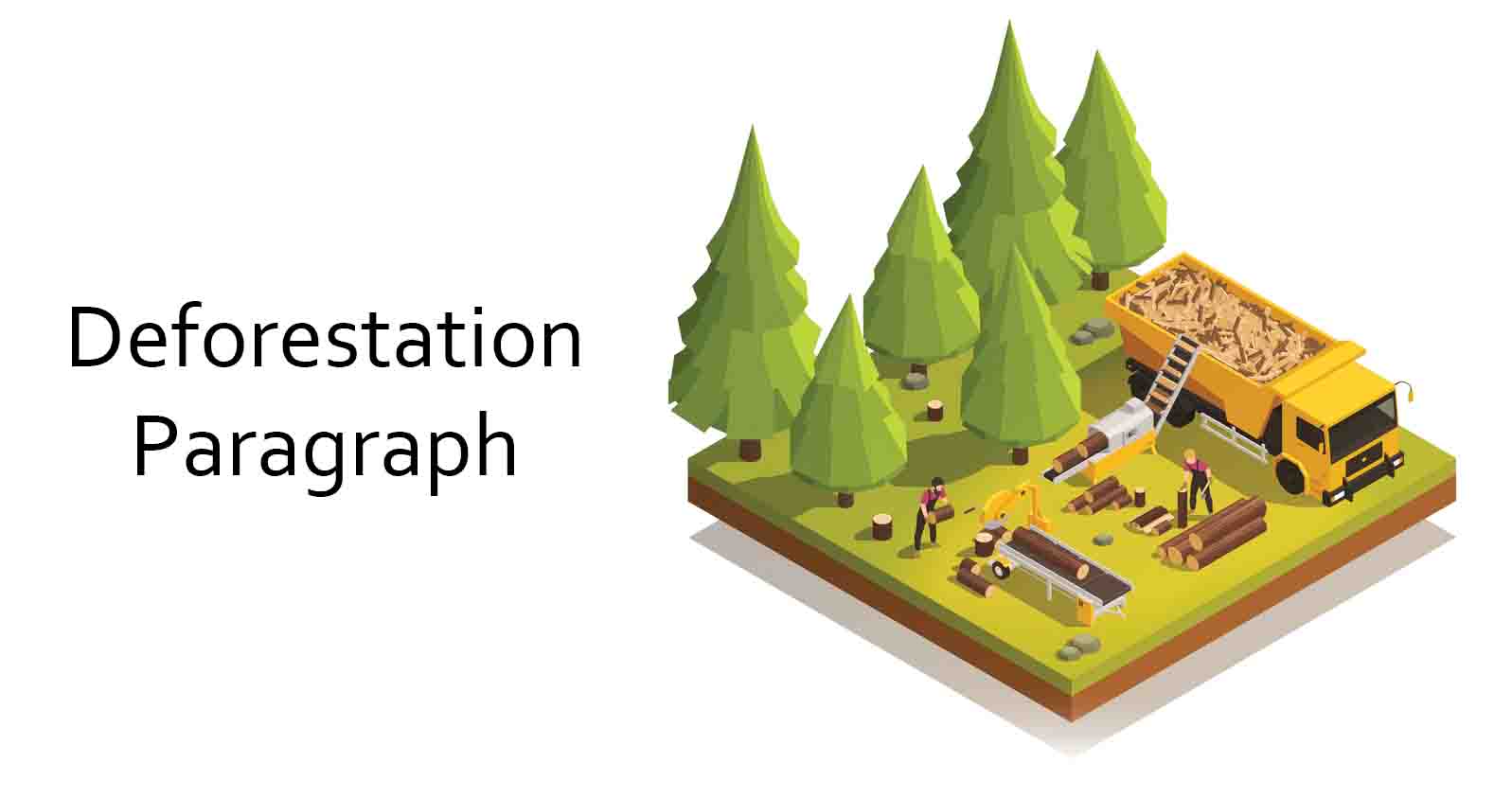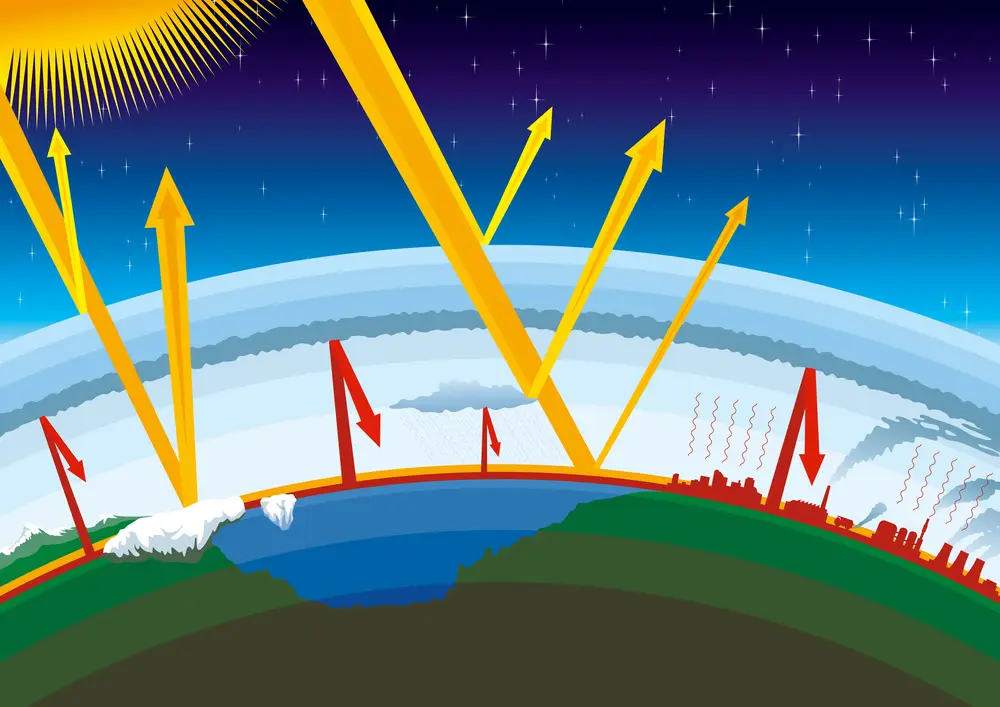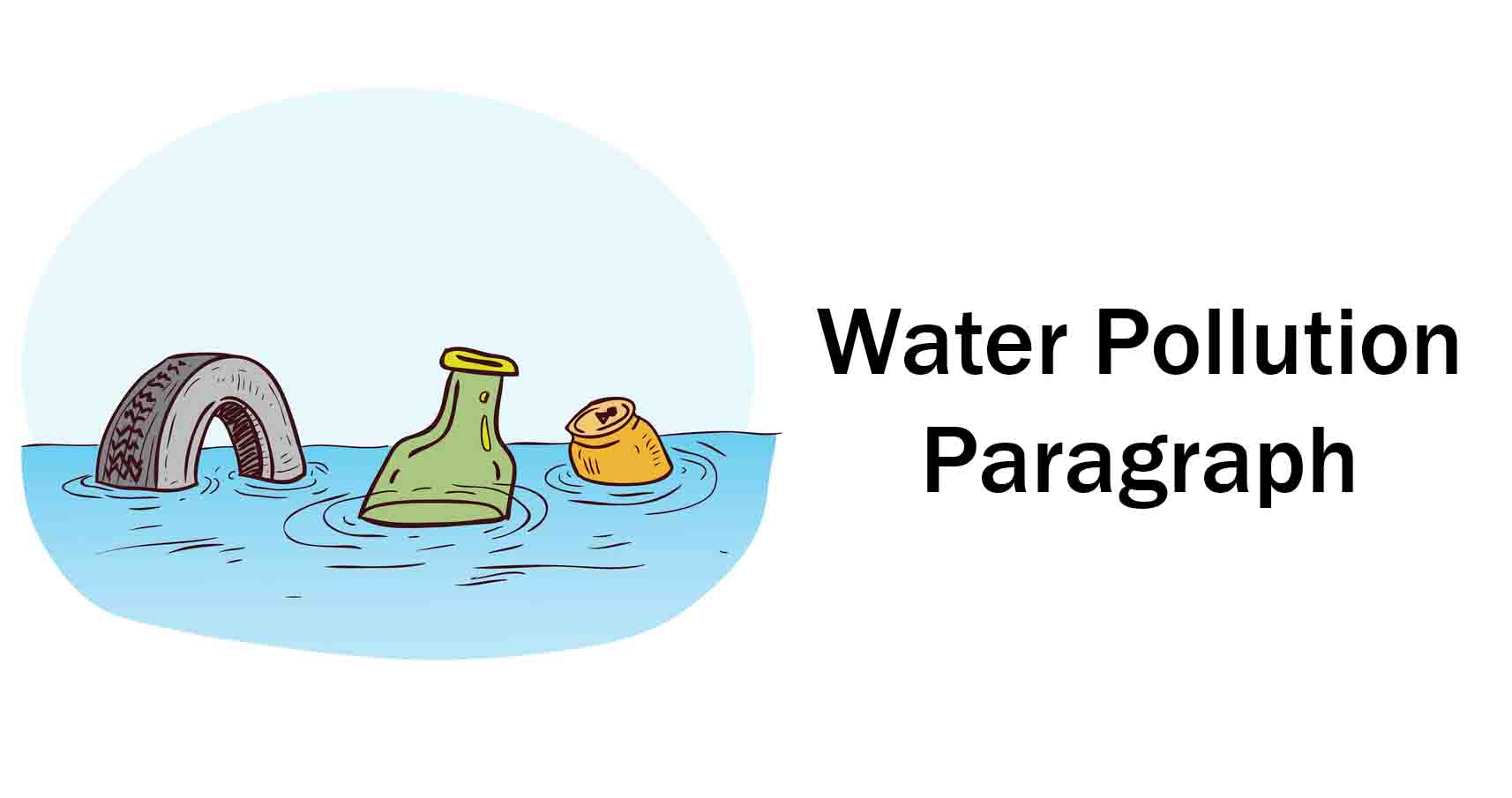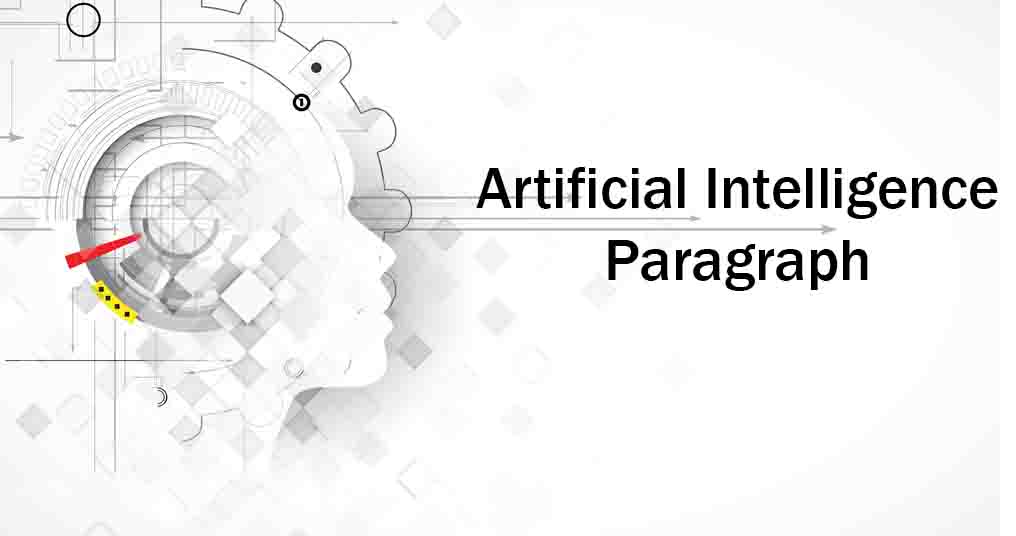Global warming paragraph for hsc, ssc and in 100-500 words
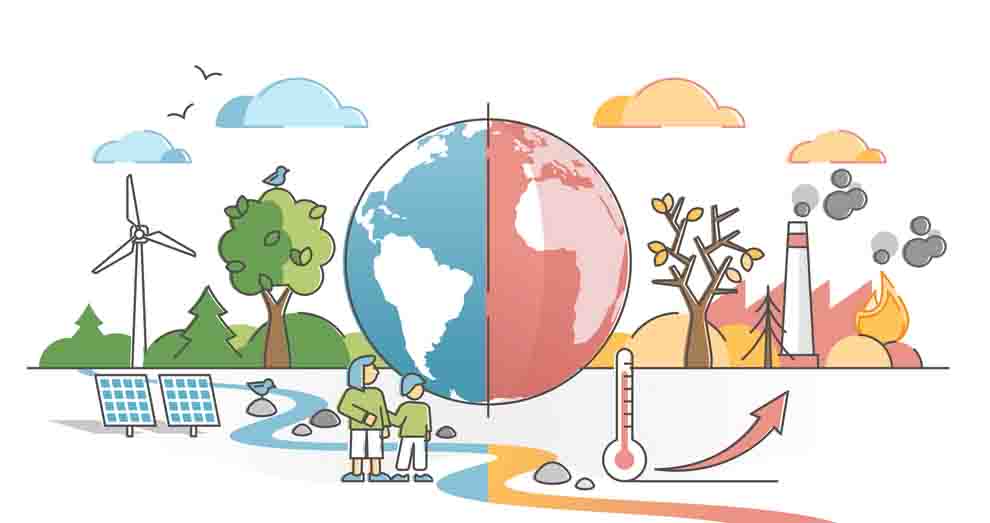
Global Warming Paragraph in 300 Words for HSC
Global warming refers to the long-term trend of rising average global temperatures due to human activities that produce greenhouse gas emissions, such as burning fossil fuels, deforestation, and industrial processes. The greenhouse gases trap heat in the Earth’s atmosphere, leading to the planet’s gradual warming. The consequences of global warming are widespread and potentially catastrophic. They include rising sea levels, extreme weather events such as hurricanes, heat waves, droughts, and the loss of biodiversity and habitats. Moreover, the warming of the planet can cause significant changes to ecosystems, such as altered migration patterns and breeding seasons for animals and plants, which can disrupt entire food chains. To mitigate the impacts of global warming, countries around the world have taken measures to reduce their greenhouse gas emissions. Some of the solutions include shifting to renewable energy sources such as solar, wind, and hydropower, promoting energy-efficient practices, and improving transportation infrastructure to reduce emissions from vehicles. Additionally, individuals can take steps to reduce their carbon footprint, such as using public transportation, reducing meat consumption, and conserving energy in their homes. The impacts of global warming are unevenly distributed, with low-income and marginalized communities often facing the worst consequences. They have limited access to resources and information, making it more challenging to adapt to changing conditions. Therefore, global warming is not just an environmental issue, but also a social justice and human rights issue. The scientific consensus on global warming is clear: the Earth’s temperature is increasing, and human activities are the primary cause. The international community has recognized the urgency of the issue, with the Paris Agreement as a crucial step toward mitigating the impacts of global warming. However, more must be done to ensure a sustainable future for ourselves and the planet.
Global Warming Paragraph in 250 Words for SSC
Global warming is the gradual increase in the Earth’s average surface temperature, primarily caused by human activities that release greenhouse gases into the atmosphere. The most significant contributors to global warming are the burning of fossil fuels for energy, deforestation, and industrial processes. These activities release carbon dioxide, methane, and other gases that trap heat in the atmosphere and lead to a rise in global temperatures. The impacts of global warming are already being felt around the world. The rise in temperature is causing glaciers to melt, sea levels to rise, and weather patterns to become more extreme, resulting in devastating natural disasters such as floods, droughts, and wildfires. Additionally, the warming of the planet is disrupting ecosystems, causing changes in animal and plant behavior, and leading to the extinction of some species. To mitigate the impacts of global warming, individuals and governments must take action to reduce greenhouse gas emissions. This can be achieved through the use of renewable energy sources, such as solar and wind power, promoting energy-efficient practices, and improving public transportation. Changes in personal habits, such as reducing meat consumption and conserving energy at home, can also make a significant difference. Global warming is a global issue that requires collective action. Governments around the world have recognized the urgency of the situation and have taken steps to address it, such as the Paris Agreement, which aims to limit global warming to well below 2°C above pre-industrial levels. However, more work needs to be done to ensure a sustainable future for ourselves and future generations.
Global Warming Paragraph in 200 Words for Class 8
Global warming is the gradual increase in the Earth’s average temperature caused by human activities that release greenhouse gases into the atmosphere. These gases trap heat in the Earth’s atmosphere, leading to a gradual increase in temperature. The primary contributors to global warming are the burning of fossil fuels for energy, deforestation, and industrial processes. The impacts of global warming are widespread and potentially catastrophic. They include rising sea levels, extreme weather events, loss of biodiversity, and altered migration patterns for animals and plants. These impacts can have significant consequences for ecosystems and human societies around the world. To mitigate the impacts of global warming, individuals and governments must take action to reduce greenhouse gas emissions. This can be achieved through the use of renewable energy sources, promoting energy-efficient practices, improving transportation infrastructure, and reducing meat consumption. Addressing global warming requires collective action on a global scale. Governments around the world have recognized the urgency of the situation and have taken steps to address it, such as the Paris Agreement. However, it is essential to continue to work towards a sustainable future to minimize the impacts of global warming on our planet and future generations.
Global Warming Paragraph in 150 Words for Class 7
Global warming is the gradual increase in the Earth’s average temperature caused by human activities that release greenhouse gases into the atmosphere. The primary contributors to global warming are the burning of fossil fuels, deforestation, and industrial processes. The impacts of global warming are widespread and potentially catastrophic, including rising sea levels, extreme weather events, loss of biodiversity, and altered migration patterns for animals and plants. To mitigate the impacts of global warming, individuals and governments must take action to reduce greenhouse gas emissions. This can be achieved through the use of renewable energy sources, promoting energy-efficient practices, improving transportation infrastructure, and reducing meat consumption. Addressing global warming requires collective action at a global scale, and it is essential to continue to work towards a sustainable future to minimize the impacts of global warming on our planet and future generations.
Global Warming Paragraph in 100 Words for Class 6
Global warming is the gradual increase in the Earth’s average temperature caused by human activities that release greenhouse gases into the atmosphere. The impacts of global warming are potentially catastrophic, including rising sea levels, extreme weather events, loss of biodiversity, and altered migration patterns. To mitigate these impacts, individuals and governments must take action to reduce greenhouse gas emissions through the use of renewable energy sources, promote energy-efficient practices, and reduce meat consumption. Addressing global warming requires collective action, and it is essential to work towards a sustainable future to minimize the impacts on our planet and future generations.
Global Warming Paragraph in 500 Words
Global warming is the gradual increase in the Earth’s average temperature caused by human activities that release greenhouse gases into the atmosphere. The most significant contributors to global warming are the burning of fossil fuels for energy, deforestation, and industrial processes. These activities release carbon dioxide, methane, and other gases that trap heat in the atmosphere and lead to a rise in global temperatures.
The impacts of global warming are already being felt around the world. The rise in temperature is causing glaciers to melt, sea levels to rise, and weather patterns to become more extreme, resulting in devastating natural disasters such as floods, droughts, and wildfires. Additionally, the warming of the planet is disrupting ecosystems, causing changes in animal and plant behavior, and leading to the extinction of some species.
One of the most significant impacts of global warming is the rise in sea levels. As glaciers melt and ice caps shrink, water from these sources flows into the ocean, causing sea levels to rise. This rise in sea levels can cause devastating effects on coastal communities, including flooding, erosion, and loss of habitat for marine life. The frequency and severity of extreme weather events such as hurricanes, typhoons, and cyclones are also on the rise due to global warming.
Another significant impact of global warming is the loss of biodiversity. As ecosystems are disrupted by changing weather patterns and temperature, some species are unable to adapt and are at risk of extinction. The loss of biodiversity can have far-reaching consequences for the environment and human society, as many species play important roles in maintaining ecological balance and providing vital services such as pollination and pest control.
To mitigate the impacts of global warming, individuals and governments must take action to reduce greenhouse gas emissions. This can be achieved through the use of renewable energy sources, such as solar and wind power, promoting energy-efficient practices, and improving public transportation. Changes in personal habits, such as reducing meat consumption and conserving energy at home, can also make a significant difference.
Governments around the world have recognized the urgency of the situation and have taken steps to address it, such as the Paris Agreement, which aims to limit global warming to well below 2°C above pre-industrial levels. However, more work needs to be done to ensure a sustainable future for ourselves and future generations.
One of the key challenges in addressing global warming is the need for collective action at a global scale. The impacts of global warming are felt globally, but the responsibility for reducing emissions is not shared equally. Developed countries have historically been responsible for the majority of greenhouse gas emissions, but developing countries are also contributing significantly to the problem as they industrialize. The challenge is to find a way to reduce emissions while also ensuring that all countries have access to the resources and technologies needed for sustainable development.
Another challenge is the political will to take action. While many governments have made commitments to reduce emissions, progress has been slow in some cases. In some countries, there is still a reluctance to make the necessary changes to reduce emissions due to economic or political considerations. Overcoming these obstacles will require continued advocacy and education to build public support for action on global warming.
In conclusion, global warming is a global issue that requires collective action. The impacts of global warming are already being felt around the world, and urgent action is needed to mitigate them. Governments, individuals, and businesses all have a role to play in reducing greenhouse gas emissions and promoting sustainable development. While the challenge is significant, there are also opportunities to create a more equitable and sustainable future for ourselves and future generations.
Key Points for Global Warming Paragraph
What is global warming?
Global warming refers to the gradual increase in the Earth’s average temperature caused by human activities that release greenhouse gases into the atmosphere, such as the burning of fossil fuels.
What are the causes of global warming?
The primary cause of global warming is human activities that release greenhouse gases into the atmosphere, including the burning of fossil fuels, deforestation, and industrial processes.
What are the impacts of global warming?
The impacts of global warming include rising sea levels, extreme weather events, loss of biodiversity, altered migration patterns, and disruptions to ecosystems. These impacts can have devastating consequences for the environment and human society.
What is the Paris Agreement?
The Paris Agreement is an international agreement signed in 2015 that aims to limit global warming to well below 2°C above pre-industrial levels and pursue efforts to limit the increase to 1.5°C. It was adopted by 196 parties and entered into force in 2016.
What are some solutions to global warming?
Solutions to global warming include reducing greenhouse gas emissions through the use of renewable energy sources, promoting energy-efficient practices, improving public transportation, and reducing meat consumption. Governments, businesses, and individuals all have a role to play in reducing emissions.
What is the role of individuals in addressing global warming?
Individuals can make a difference by reducing their carbon footprint through actions such as using energy-efficient appliances, reducing car usage, and eating a plant-based diet. Additionally, individuals can advocate for policies that address global warming and encourage others to take action.
What are the challenges in addressing global warming?
The challenges in addressing global warming include the need for collective action at a global scale, the political will to take action, and the uneven distribution of responsibility for reducing emissions. Overcoming these challenges will require continued advocacy and education to build public support for action on global warming.



